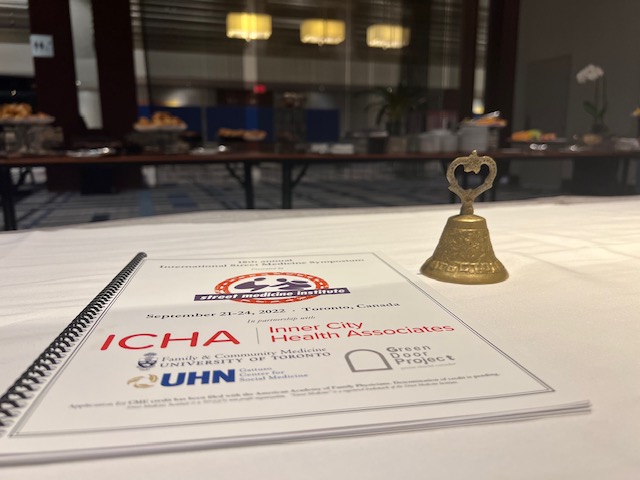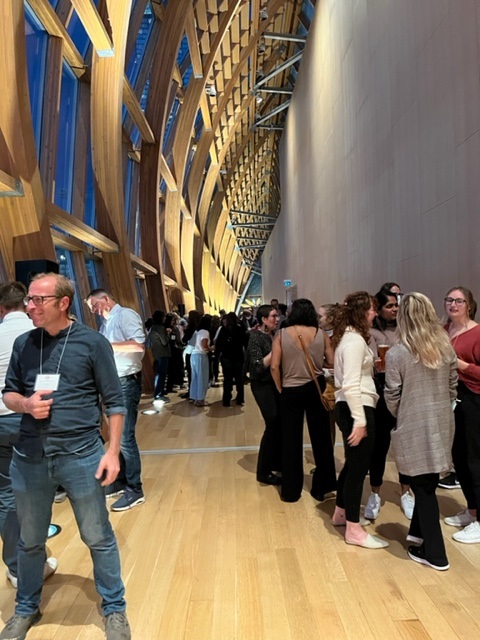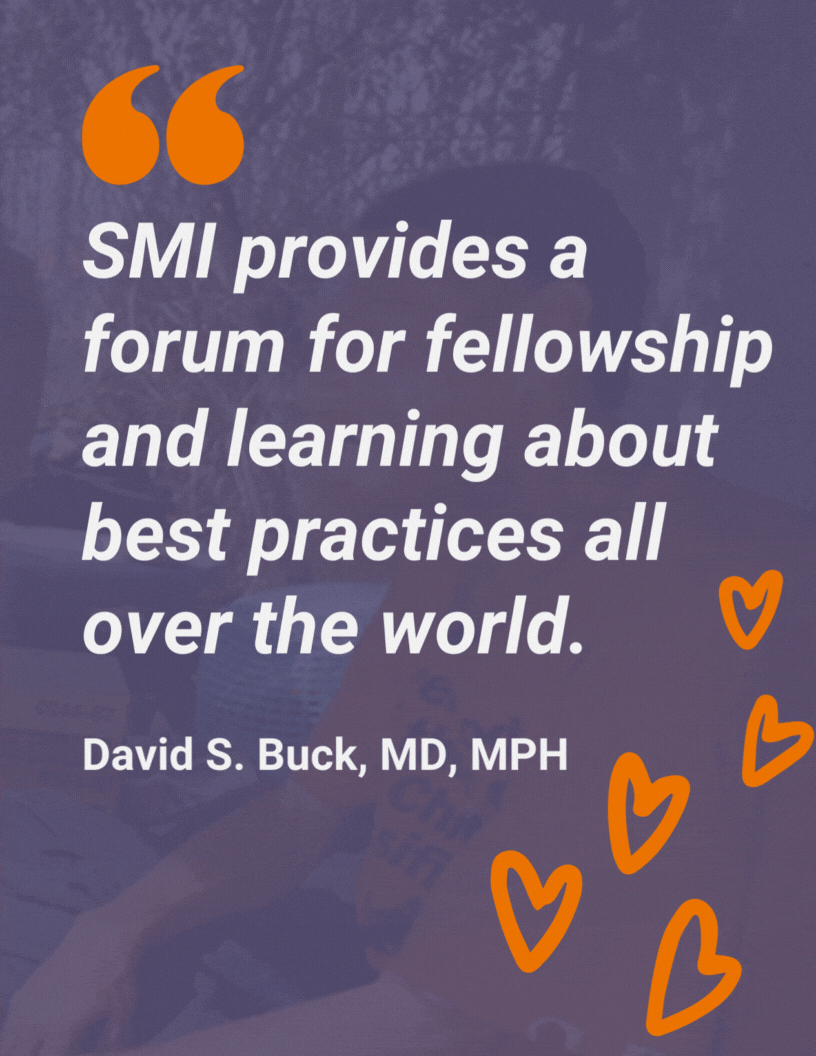 All of us at Inner City Health Associates (ICHA) were so thrilled to host the 18th International Street Medicine Symposium in Toronto from September 21st – 24th this year! It had been such a long and gruelling time for all since we were all able to get together and we were so galvanized and inspired by the passion, kindness, commitment and innovative work being done throughout the world for to support the health and housing of unsheltered people and communities.
All of us at Inner City Health Associates (ICHA) were so thrilled to host the 18th International Street Medicine Symposium in Toronto from September 21st – 24th this year! It had been such a long and gruelling time for all since we were all able to get together and we were so galvanized and inspired by the passion, kindness, commitment and innovative work being done throughout the world for to support the health and housing of unsheltered people and communities.
We were so honoured to be able to share with attendees the breadth and scale of practice, education and research being done in Canada. Host-City Day opened with an important Land Acknowledgement by ICHA’s Board Chair Dr. Philip Berger, grounding our ongoing work and lives in the territory of numerous Indigenous Nations, connecting our present realities and initiatives to the ongoing need for reconciliation for the profound harms to Indigenous Peoples from historical and ongoing colonization. As Dr. Berger described, Land Acknowledgements are never just simple statements of protocol, but an invitation to serious reflection and action towards reconciliation in the present and how such work is personally connected to the life and work of the person offering such an acknowledgement. In short, the work of reconciliation requires substantive rather than performative commitment.
The four morning plenary sessions followed a high-level sequence orienting attendees to the Canadian Healthcare system, including both its promise and strengths and where it is lagging and in need of structural and delivery reform.
Dr. Danielle Martin, Chair of the Department of Family and Community Medicine at the University of Toronto and Director of the WHO Collaborating Centre on Family Medicine and Primary Care, opened the morning describing Canada’s Healthcare system (actually 13 unique Provincial and Territorial systems) with its commitment to Medicare, Canada’s legal framework requiring Universality, Accessibility, Portability, Comprehensiveness and Portability. Dr. Martin underscored that while these were absolutely necessary to the project of universal health care, they fell short in their conceptualization and implementation, particularly with respect to pharmacare, dental care, mental health care and the accessibility of the healthcare system in practice, particularly for those facing discrimination, geographical and institutional barriers, and the lack of identifying documentation which is so common for unhoused people. Dr. Martin noted that the COVID-19 pandemic provided key ‘light bulb moments’ for improvement, including the reach and impact of virtual care, the fundamental need for strong mental healthcare systems, and the spotlight shone on the devastating impact of inequities in the social determinants of health, particularly housing, income, racialization and disability. Together, the healthcare system weaknesses Dr. Martin described provide the terrain which we must continue to follow, on our structurally necessary foundation, in our pursuit of health equity.
 As Indigenous leaders and healthcare providers, Dr. Suzanne Shoush and Cheryllee Bourgeois, brought critical attention to the necessity, place and process of reconciliation with Indigenous Peoples and Nations at both societal governance and policy levels and in the daily work of organizations and programs. Their presentation highlighted the inherent value and power in Indigenous kinship and networks of affiliation in the design, delivery, research and evaluation of Indigenous health services. They also provided a critical reminder that Indigenous Peoples everywhere disproportionately experience homelessness, including unsheltered homelessness, frequently well out of the view of non-Indigenous communities. As shared by Dr. Shoush and Ms Bourgeois, Indigenous self-determination in the governance and delivery of their healthcare is an operational imperative for success and both an inherent right and requirement under international human rights law.
As Indigenous leaders and healthcare providers, Dr. Suzanne Shoush and Cheryllee Bourgeois, brought critical attention to the necessity, place and process of reconciliation with Indigenous Peoples and Nations at both societal governance and policy levels and in the daily work of organizations and programs. Their presentation highlighted the inherent value and power in Indigenous kinship and networks of affiliation in the design, delivery, research and evaluation of Indigenous health services. They also provided a critical reminder that Indigenous Peoples everywhere disproportionately experience homelessness, including unsheltered homelessness, frequently well out of the view of non-Indigenous communities. As shared by Dr. Shoush and Ms Bourgeois, Indigenous self-determination in the governance and delivery of their healthcare is an operational imperative for success and both an inherent right and requirement under international human rights law.
Dr. Monty Ghosh, the lead at Alberta Health Services for homelessness responses, guided attendees through a public health approach to the opioid epidemic while highlighting that the toxic drug supply has become the leading cause of mortality of unhoused people internationally. Dr. Ghosh described the continuum of substance use care supports from detoxification and abstinence-based models through medication assisted addictions medicine practice underlining the ongoing deep inequities in access to effective addictions medicine services. Reflecting Canada’s leadership in North America, Dr. Ghosh described the spectrum of harm reduction interventions from safer use supplies to safe injection and consumption sites, initially pioneered in Vancouver, BC at InSite. Beyond safer supply provision, the emerging evidence of impact for ‘safe supply’ substitution prescribing was outlined, as was the need for policy reform including decriminalization to undercut the ineffective incarceration of people using substances and to properly and safely regulate the drug supply to prevent its toxic and rapidly expanding reach.
The morning sessions concluded with a powerful presentation by Dr. Andrew Boozary, the Executive Director of the Gattuso Centre for Social Medicine at University Health Network, Canada’s largest hospital. Dr. Boozary began by demonstrating just how slow progress has been in understanding and acting on the social determinants of health, with postal code analyses and housing and homeless related morbidity and mortality patterns having been firmly demonstrated and published for >150 years. Lamenting the dire lack of adequate affordable and supportive housing in Canada and internationally, he shared how hospitals such as University Health Network are beginning to intervene in the provision of housing with supports, leveraging their considerable fiscal resources and property. While sharing that this shouldn’t be necessary, he described how hospitals were facing untenable alternatives in medicalizing homelessness and ultimately found supportive housing more efficient in the absence of effective social policy. His presentation concluded with the stark reminder that the pandemic brought new exposure on the profound social and health inequities faced by poor, racialized and Indigenous communities everywhere, requiring a reorientation and renewed commitment of our health services to the delivery of equitable public good.
The 16 afternoon concurrent workshops were divided into 4 themes, including: Leadership by Survivors and People with Lived Experience; Community and Organizational Capacity Building; Systems Building and Integration from Streets to Homes; and Mental Health Care for Unsheltered Communities. All sessions were lively and provided so much opportunity to explore areas of common complexity and commitment, discuss emerging practices and challenge convention. Topics ranged from peer-based population health interventions including vaccinations to protest medicine in encampments and the struggle amongst survivors of the mental health and homelessness systems for autonomous organizations and practice. Frameworks to address the ongoing uncertain threat of monkeypox were shared, as were important in-depth follow-ups from the morning that addressed Indigenous health strategies, novel safer supply substance use substitution programs including a new unique fentanyl program in Vancouver, and the delivery of outreach palliative care and psychiatry programs. Foregrounding the critical importance of housing as the most powerful medicine, new rapid modular housing initiatives by the City of Toronto’s Housing Secretariat that directly housed hundreds of unsheltered people were described, outlining potential path to sustainable supportive housing for all.
Together, the Host City Day painted the picture of vigorous thinking, passion and action to understand and improve the health and housing of some of the most vulnerable, excluded and harmed people in our communities. This important perspective was carried over throughout the remaining conference days where all of us in Canada learned so much from all our international colleagues. We were overjoyed for our Canadian partner, Dr. Kaitlin Schwann, to deliver the Withers Family Keynote address outlining the intersection of the street medicine and human rights movements and the need for all of us to approach our work as human rights defenders, as our clients and patients approach their homelessness and housing experiences as rights holders and claimants. Canada’s Protocol on a Human Rights Approach to Encampments has already made significant inroads into better ways to support our unhoused communities while working towards the fulfillment of their right to sustainable housing. We are so grateful for having had the opportunity to host the International Street Medicine Symposium and learn alongside all attendees. We want to share a special thank you from all of us to the Street Medicine Institute and its entire leadership team for entrusting us with the responsibility of hosting the conference, and to all of you for joining us in Toronto. We look forward to seeing you all next year!
Sincerely,
Andrew Bond, MD, CCFP, FCFP
Medical Director, Inner City Health Associates


